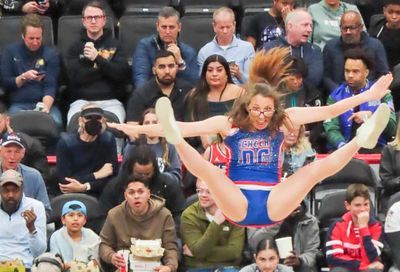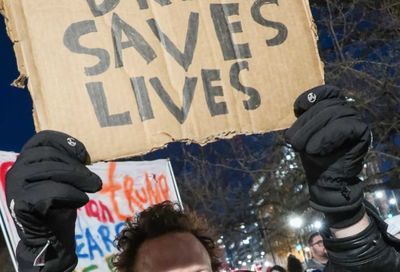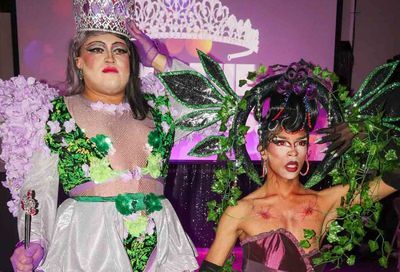Choi Found Guilty
Gay rights activist fined $100 for actions related to 2010 White House protest against ''Don't Ask, Don't Tell''
A U.S. magistrate judge Thursday found former Army Lt. Dan Choi, a gay rights activist who became famous for being discharged under the military’s ”Don’t Ask, Don’t Tell” (DADT) policy following his coming out on national television, guilty of failing to obey an order of a law enforcement agent during a 2010 protest against DADT where Choi chained himself to the White House fence.
Magistrate Judge John M. Facciola found Choi ”guilty beyond a reasonable doubt” and fined him $100, which Choi loudly announced he was refusing to pay. As Facciola was exiting the courtroom, Choi asked Facciola to send him to jail, a request to which Facciola did not respond.

Dan Choi outside the U.S. district court prior to his trial, with Rev. C.T. Vivian (right).
(Photo by Rick Rosendall)
As Choi left the courtroom Thursday afternoon, the courtroom audience, filled with Choi’s family, friends and fellow LGBT activists, burst into a round of applause as Choi loudly announced, from amid a pack of deputies from the U.S. Marshals Service, ”I am not guilty, and I am not ashamed, and I am not finished.”
The guilty verdict brought an end to a nearly three-year struggle for Choi, who, following his arrest with 12 other activists on Nov. 15, 2010, was charged in U.S. District Court with failing to obey a lawful order. But Choi had been arrested in March and April of 2010 during similar protests, for which he was charged in D.C. Superior Court. The D.C. Attorney General’s Office later dropped those charges, in part because the office determined that the ledge on which the White House fence sits and where Choi and his fellow protesters had been standing did not constitute part of the sidewalk. The order issued by U.S. Park Police in all three incidents was for the protesters to ”leave the sidewalk” around the White House.
Choi went to trial in August of 2011, but the case abruptly stopped and was indefinitely postponed for 19 months after Assistant U.S. Attorney Angela George informed Facciola she intended to file a writ of mandamus against him for allowing Choi’s then-defense team of Robert Feldman and Norman Kent to investigate and pursue a defense of selective or vindictive prosecution by the government against Choi for actions related to his First Amendment rights.
Facciola had found there was prima facie evidence for vindictive prosecution, meaning enough evidence was presented to allow Choi’s defense to pursue a claim. This would have allowed Choi’s lawyers to ask the government to provide more documents and evidence investigating whether higher-level officials advised subordinates to try Choi in federal court as a way to try and silence him for the content of his speech.
But Chief Judge Royce C. Lamberth, the U.S. District Judge for the District of Columbia, ruled to issue the writ of mandamus, which prevented Facciola from taking into account whether prosecutors were treating Choi differently because he was openly gay and protesting, in full military uniform, the now-defunct DADT policy. This move essentially limited potential defenses available to Choi.
In court on Thursday, Choi represented himself, cross-examining witnesses and making a series of disjointed points in order to defend himself against the charge. But Choi seemed scattered throughout the exercise, at one point breaking down into tears as he showed the courtroom a video clip of ”The Rachel Maddow Show,” the show on which he initially came out by publicly stating he was gay.
Following his tears, Choi got up and loudly told Facciola that he was ready for closing arguments. Facciola called a recess and ordered the parties to come back for closing arguments later that afternoon. Choi then had what several friends and observers characterized as a ”breakdown,” during which deputies from the U.S. Marshals Service forced the audience to exit the courtroom.
Support Metro Weekly’s Journalism
These are challenging times for news organizations. And yet it’s crucial we stay active and provide vital resources and information to both our local readers and the world. So won’t you please take a moment and consider supporting Metro Weekly with a membership? For as little as $5 a month, you can help ensure Metro Weekly magazine and MetroWeekly.com remain free, viable resources as we provide the best, most diverse, culturally-resonant LGBTQ coverage in both the D.C. region and around the world. Memberships come with exclusive perks and discounts, your own personal digital delivery of each week’s magazine (and an archive), access to our Member's Lounge when it launches this fall, and exclusive members-only items like Metro Weekly Membership Mugs and Tote Bags! Check out all our membership levels here and please join us today!





















